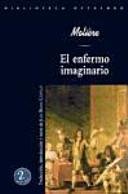Obras
Frases célebres de Molière
“Los médicos no son para eso; su misión es recetar y cobrar; el curarse o no es cuenta del enfermo.”
Fuente: El enfermo imaginario.
Frases de hombres de Molière
“Se puede ser un buen hombre y hacer malos versos.”
Fuente: https://citas.in/colecciones/5687/anorandote-con-embeleso/
“El papel de hombre de bien es el más fácil de representar.”
Fuente: Amate Pou (2017), p. 101. https://books.google.es/books?hl=es&id=MHJNDwAAQBAJ&q=Moli#v=snippet&q=%22Corrige%20las%20costumbres%22&f=false Consultado el 20 de enero de 2020.
Frases de fe de Molière
Sin fuentes
Sganarelle a Don Juan
Molière Frases y Citas
Variante: A quienes me preguntan la razón de mis viajes les contesto que sé bien de qué huyo pero ignoro lo que busco
Fuente: Epitafio de Molière, redactado en vida por él mismo.
“No sabía que durante toda mi vida había hablado en prosa.”
Fuente: Monsieur Jourdain, personaje de El burgués gentilhombre.
El misántropo.
Fuente: [[Guerrero del Río], Eduardo, Diccionario de citas literarias II, 17, RIL Editores, 2007] ISBN 9789562845809 https://books.google.es/books?id=USiTnlyqvvsC&dq=Diccionario+de+citas+literarias+II.+eduardo+guerrero&hl=es&source=gbs_navlinks_s En Google Books. Consultado el 14 de junio de 2019.
Fuente: Amate Pou (2017), p. 101. https://books.google.es/books?hl=es&id=MHJNDwAAQBAJ&q=Moli#v=snippet&q=%22Corrige%20las%20costumbres%22&f=false Consultado el 20 de enero de 2020.
“Es un magnífico orador: conoce el arte de no decir nada en una gran arenga.”
Fuente: Amate Pou (2017), p. 102. https://books.google.es/books?hl=es&id=MHJNDwAAQBAJ&q=Moli#v=snippet&q=Molière&f=false Consultado el 20 de enero de 2020.
“Hay que comer para vivir y no vivir para comer.”
Fuente: Amate Pou (2017), p. 100. https://books.google.es/books?hl=es&id=MHJNDwAAQBAJ&q=Moli#v=snippet&q=Molière&f=false Consultado el 20 de enero de 2020.
Fuente: Amate Pou (2017), p. 101. https://books.google.es/books?hl=es&id=MHJNDwAAQBAJ&q=Moli#v=snippet&q=%22Corrige%20las%20costumbres%22&f=false Consultado el 20 de enero de 2020.
“La improvisación es la verdadera piedra de toque del ingenio.”
Fuente: Amate Pou (2017), p. 98. https://books.google.es/books?hl=es&id=MHJNDwAAQBAJ&q=Moli#v=snippet&q=Molière&f=false Consultado el 20 de enero de 2020.
“Las dudas son más crueles que la peor de las verdades.”
Fuente: Amate Pou (2017), p. 102. https://books.google.es/books?hl=es&id=MHJNDwAAQBAJ&q=Moli#v=snippet&q=Molière&f=false Consultado el 20 de enero de 2020.
“No hay cosa tan censurable que un amigo que no sea sincero.”
Fuente: Amate Pou (2017), p. 101. https://books.google.es/books?hl=es&id=MHJNDwAAQBAJ&q=Moli#v=snippet&q=%22Corrige%20las%20costumbres%22&f=false Consultado el 20 de enero de 2020.
“Si esta es vuestra forma de amar, os ruego que me odiéis.”
Fuente: Amate Pou (2017), p. 98. https://books.google.es/books?hl=es&id=MHJNDwAAQBAJ&q=Moli#v=snippet&q=Molière&f=false Consultado el 20 de enero de 2020.
Molière: Frases en inglés
Plus on aime quelqu'un, moins il faut qu'on le flatte:
À rien pardonner le pur amour éclate.
Act II, sc. iv
Le Misanthrope (1666)
“It is a wonderful seasoning of all enjoyments to think of those we love.”
C'est un merveilleux assaisonnement aux plaisirs qu'on goûte que la présence des gens qu'on aime.
Act V, sc. iv
Le Misanthrope (1666)
“A learned fool is more foolish than an ignorant one.”
Un sot savant est sot plus qu'un sot ignorant.
Act IV, sc. iii
Les Femmes Savantes (1672)
“My lord Jupiter knows how to sugarcoat the pill.”
Le Seigneur Jupiter sait dorer la pilule.
Act III, sc. x
Amphitryon (1666)
“We die only once, and for such a long time!”
On ne meurt qu'une fois; et c'est pour si longtemps!
Le Dépit Amoureux (1656), Act V, sc. iii
“I have the defect of being more
sincere than persons wish.”
Fuente: The Misanthrope
“One must eat to live, and not live to eat.”
Il faut manger pour vivre, et non pas vivre pour manger.
L'Avare (1668), Act III, sc. i.
Firstly, an inaccurate sourcing: in Act III, yes—but in Scene I, no: rather, in Scene V—HARPAGON, VALÈRE, MASTER JACQUES (see, e.g., the Project Gutenberg HTML version of the English translation: http://www.gutenberg.org/files/6923/6923-h/6923-h.htm). Secondly, a misattribution made clear by the Molière text—the character in the play, VAL, obviously points out that the quote refers to a "saying of one of the ancients" (and the quote is precisely written in quotation marks as well), in the full line of dialogue below:
Know, Master Jacques, you and people like you, that a table overloaded with eatables is a real cut-throat; that, to be the true friends of those we invite, frugality should reign throughout the repast we give, and that according to the saying of one of the ancients, "We must eat to live, and not live to eat."
The "ancients" to which VAL/Molière refers is Cicero, Diogenes Laertius, and the oldest known attribution, Socrates (whom Laertius explicitly attributes—and Cicero presumably invokes). Various books of quotations document this—e.g., Elizabeth Knowles' 2006 The Oxford Dictionary of Phrase and Fable (http://books.google.com/books?id=r2KIvsLi-2kC&dq=%22one+must+eat+to+live+not+live+to+eat%22&source=gbs_navlinks_s) and Jennifer Speake's 1982 A Dictionary of Proverbs (http://books.google.com/books?id=-IpkOkM3IfEC&dq=%22one+must+eat+to+live+not+live+to+eat%22&source=gbs_navlinks_s): the former lists the quote as "a proverbial saying, late 14th century, distinguishing between necessity and indulgence; Diogenes Laertius says of Socrates, 'he said that other men live to eat, but eats to live.' A similar idea is found in the Latin of Cicero, 'one must eat to live, not live to eat'"; the latter, reiterates this. Moreover, in William Shepard Walsh's 1909 Handy-book of Literary Curiosities, he adds that "According to Plutarch, what Socrates said was, 'Bad men live that they may eat and drink, whereas good men eat and drink that they may live.'" He also adds that Atheneus quotes similarly to Laertius, as well as explores other later variations (http://books.google.com/books?id=hrJkAAAAMAAJ&source=gbs_navlinks_s).
Misattributed
“Each day my reason tells me so; But reason doesn't rule in love, you know.”
Fuente: The Misanthrope
“I prefer an accommodating vice
To an obstinate virtue.”
J'aime mieux un vice commode,
Qu'une fatigante vertu.
Act I, sc. iv
Amphitryon (1666)
“The world, dear Agnes, is a strange affair.”
Le monde, chère Agnès, est une étrange chose.
L'École des Femmes (1662), Act II, sc. v

